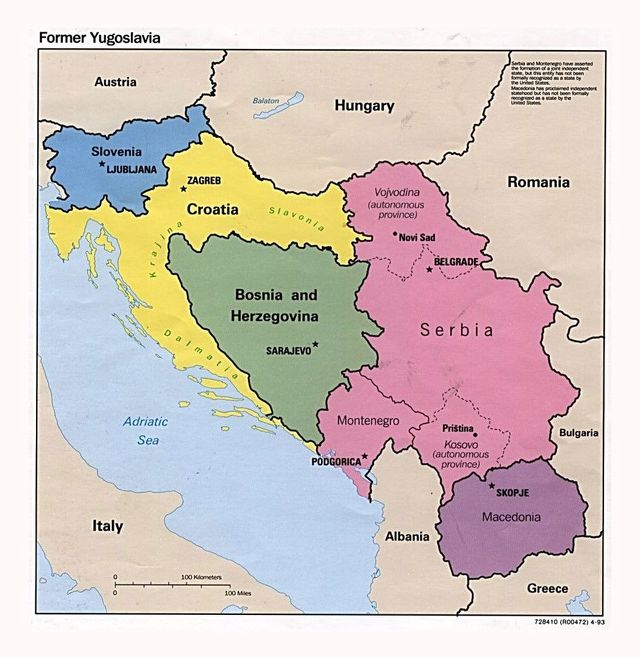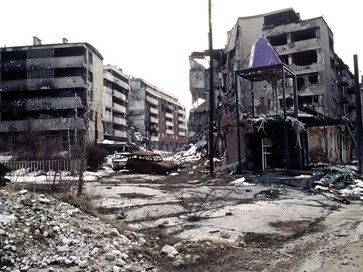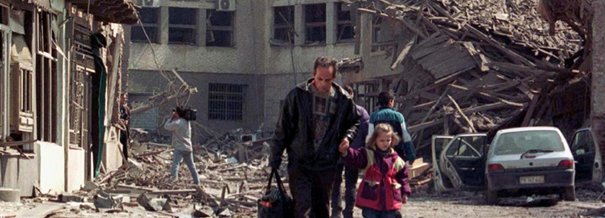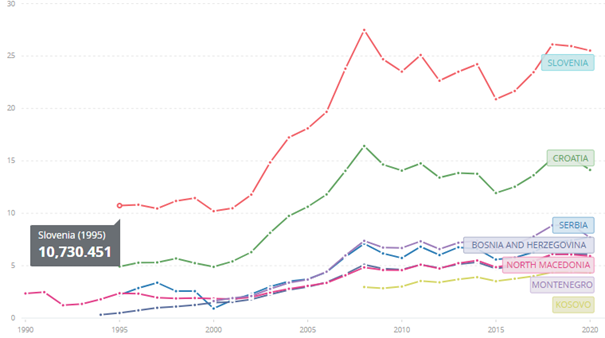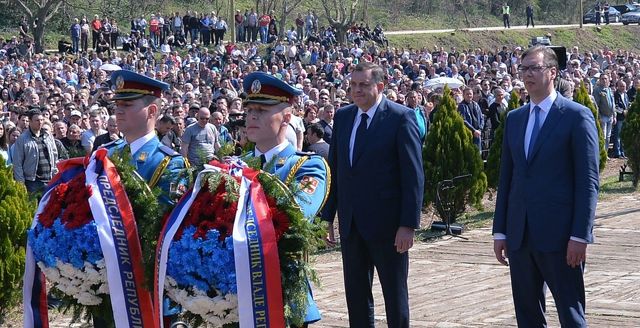Kutatás / Geopolitika
The Loneliness of Serbia Called Neutrality
Serbia declared military independence and neutrality in 2007. Prior, it seemed to follow the Slovenian and Croatian model to join the EU and NATO; the country has now turned its back on the military organisation. Serbia declared neutrality challenging to maintain, as no one recognises it, nor does the Serbian government seek its recognition. The country manoeuvres between East and West, while the population’s living standards and opportunities are not even close to those during Yugoslav times.
The Birth and Death of Yugoslavia
After the First World War, the map of Europe became utterly redrawn. As a result of the post-conflict peace talks, some traditional states disappeared, and new formations were born. One of them was the Serbian-Croatian-Slovenian Kingdom, established in 1918, a melting pot of three great historical nations. This formation started to operate under the name Yugoslavia in 1929 but ceased to exist in 1945. After the Second World War, Yugoslavia was re-established as a communist country based on six republics and two autonomous provinces.
Figure 1: Former Yugoslavia. Source: Mapsland.com[1]
Thanks to the Non-Aligned Movement, the multinational European state led by Josip Broz Tito became a vital player even on the international level, balancing between the two giant political blocs. Tito’s success was both political and economic since the prosperity of his multi-ethnic country increased and developed enormously. One of the preconditions for this was his other success: he managed to suppress domestic nationalism to create a socialist country whose standard of living the governments of the former Eastern Bloc could only dream of. Tito successfully operated a weak dictatorship that shy away from neither the Eastern nor the Western world. Until his death in 1980, he was the undisputed ruler of the South Slavic state. Since then, however, the repressed grievances, economic problems and nationalism have gradually surfaced, dragging the country slowly into a bloody civil war and a decade-long inhuman conflict.[2]
The Outbreak of the South Slavic War
In a decade, the war in Yugoslavia destroyed everything its nations had built during forty peaceful years. With the death of Tito and the sudden break-up of the Soviet Union, previously suppressed tensions suddenly surfaced. Ultranationalist sentiments on all sides outweighed common sense, and the resulting anger turned the former allies against each other. The promise of a rapid disintegration pushed the once envied federal republic into a civil war. Tragically, the confrontation did not remain at the level of politics. The bloody conflict tore apart everything: former friendships, communities, good neighbourhoods, and even multi-ethnic families have fallen victim to it.
Figure 2: Snapshot from Sarajevo, 1995. Source: Mediterranean Journal of Social Sciences[3]
On a macro-level, the war in Yugoslavia and the subsequent conflicts can be divided into three main stages. The first one dates from 1991 until 1995, ending with the Dayton Accords. By signing this pact, the Yugoslav Civil War in the classical sense came to an end. The second phase of the war broke out in Kosovo, where local Albanians and Serbs engaged in inhuman clashes. During this phase, the Srebrenica massacre took place, in which Serbs executed nearly 8,000 Muslim men and boys. Since the Second World War, genocide has happened once again in Europe. The last stage of the war was marked by the NATO intervention in 1999. The latter was such a shock to Serbia that it still has not been able to leave it behind.
Madeleine’s War[4]
By 1999, the United States decided to resolve the Yugoslav question. As the issue failed to be fixed on the grounds of the United Nations Security Council, the US and some of its NATO allies decided to act independently without a mandate from the UN. US Secretary of State Madeleine Albright, the main initiator of the intervention, had openly threatened the Yugoslav leadership that failure to cease fire and withdraw from Kosovo would result in the bombing of the country.[5] However, the President of the former Yugoslavia, Slobodan Milošević, misjudged the situation considering the statement simply a bluff.
Figure 3: The outcome of the NATO Air War. Source: Common Dreams[6]
NATO warplanes first took to the air on 24 March 1999. From the first moment of the operations, it was clear that David and Goliath were facing each other. The world's most powerful, technologically advanced and battle-trained military machine attacked Yugoslavia, which was only equipped with an insignificant and almost completely obsolete air force and air defence. Although NATO believed the country would fall to its knees quickly, operations lasted longer than two months.[7] In the end, not only military but civilian targets, hospitals, schools and factories were also attacked by NATO warplanes. This way, the coalition wanted to force the Serbian population to turn against the Milošević regime. The power imbalance between the parties explains why NATO did not lose a single soldier during the operation. At the same time, on the Serbian side, the dead were counted in thousands – both civil and military.[8] In addition to the deceased and wounded, the Serbian population was the primary victim of the NATO intervention since the 78-day campaign threw the economy of Belgrade back by 15-20 years.[9] However, on its own, the intervention failed to democratise the country and get rid of its leadership.
The Serbian Regime Change
Although the NATO intervention in 1999 did not deprive Milošević of power, the population did so a year later. In the 2000 election, the vast majority turned against the president, and despite the apparent election fraud, the vox populi forced him to resign. Milošević’s successor in the office was Vojislav Koštunica, and in December 2000, Zoran Đinđić became prime minister. Although the new Yugoslav supreme public dignitaries disagreed on whether Milošević should be extradited to the International Criminal Tribunal or not, Đinđić's view prevailed, and the police arrested the former Yugoslav president. The United States' intense pressure on Yugoslav policymakers also contributed to this decision. A few months after his arrest in March 2001, Milošević was extradited[10] to the International Criminal Tribunal for the former Yugoslavia located in The Hague. The former president did not live up to hearing his verdict, as he died of a heart attack in 2006. However, removing Milosevic from public power did not mean the end of his regime. A sniper assassinated prime minister Zoran Đinđić in Belgrade in 2003. The perpetrator belonged to the armed circles of the former president.[11]
Economy After the Intervention
By mid-1999, the United States stifled the economy of the Western Balkan State. Because of the military action, the country's infrastructure laid in ruins and most industrial complexes were destroyed. In addition, even economic sanctions hit Yugoslavia hard. This is, however, not everything. It was inevitable for the country’s new leadership to confront the radical deep state that had extensive political, military, and underworld ties. This proved to be neither an easy nor a safe task, as the assassination of the Prime Minister clearly shows.
By the turn of the millennium, the standard of living in the formerly envied Yugoslavia became a thing of the past. The economy declined, people were deprived, and criminality rose. Unemployment skyrocketed. In the Yugoslav successor state Serbia, the unemployment exceeded the 20 per cent rate by 2006 and the 24 per cent rate by 2012. By 2020, this data fell to 9.01 per cent, which is remarkable progress over previous years but still a very high rate.[12]
Compared to the former bigger Yugoslav member states, Serbia is lagging. As the diagram of the World Bank shows, it managed to develop since the nineties, however, at the same time, Croatia's GDP per capita is almost twice that of Serbia, and Slovenia’s is even more impressive: 3.3 times that of Serbia. Both Croatia and Slovenia are members of NATO and the European Union.
Figure 4: GDP per capita (current USD). Source: The World Bank[13]
This is a huge difference given that we are talking about the successor countries of a federal state. The biggest economic loser of Yugoslavia's disintegration is the most significant political winner of it, Kosovo, which, thanks to the US decision, has gained independent statehood. However, Kosovo is economically among the poorest countries in Europe to this day, where constant UN peacekeeping is still inevitable.
Road to Neutrality
During the war, Yugoslavia was practically left alone. Although the Russian Federation consistently sided with it and tried to protect Serbian interests in the United Nations Security Council, Russia itself, economically disabled and waging domestic military conflicts, was not strong enough to counter or modify such an American decision. Almost the same applies to the People’s Republic of China (PRC), whose embassy in Belgrade was even hit during the NATO campaign killing three people. The Chinese public was outraged by the attack, and officials condemned it as a “barbarian” act.[14]
The US intervention shocked the Serbian people and created an anti-Western public sentiment. How relations between Belgrade and Washington could continue after the war was a huge dilemma. Getting rid of the Serbian political leaders who committed crimes against humanity and governed a formerly prosperous country to the verge of ruin is one thing; extraditing them to the International Criminal Tribunal for the Former Yugoslavia is another one. But these, even together, did not automatically prompt willingness to join the enemy and align with it. Even if NATO accession were likely to bring economic benefits to Serbia, as it did to other nations in the region, it would hardly have resulted in votes for the political leadership – on the contrary. And paradoxically, this public attitude stems not just from the popular spirit and experience of being physically under attack. It also comes from the deliberate and ongoing campaign that Serbian leadership has been doing since 1999, depicting the nation simply as an innocent victim of Western aggression, which was clearly not. Serbia's pursuit of military neutrality is a consequence of all this.
In the light of international law, not being a member of any military alliances means being neutral – neither de jure nor de facto. There are countless historical examples of a country aiming to be left out of a conflict in vain because of the interest of the warring parties. The experience is that the status of neutrality of a country not just requires recognition by other actors of the international community but also the availability of a robust military force that can defend the neutral state. An excellent example of this is Switzerland, where geographical location, the size and equipment of the armed forces, foreign recognition and even solid economic power are the guarantees to maintain a pragmatically neutral state. None of these predicaments, however, exist in Serbia.
It is also not easy to find a historical precedent for Serbia's neutrality in its own past; however, there are excellent examples of the opposite; think of the Balkan Alliance or the Little Entente. Moreover, Serbia's position on neutrality has been inconsistent for many reasons. Only two years after the NATO intervention, the Minister of Foreign Affairs Goran Svilanović declared[15] that the country’s goal was the Euro-Atlantic integration. Many could believe that the minister’s words were rhetorical, but this was not the case. The fact that Serbia participated in NATO-led operations such as the Partnership for Peace[16] and, since 2011, has abolished compulsory military service were credible indications of the seriousness of the intention. However, something has changed over the years.
Impacts of the Secession of Kosovo
Kosovo's secession and the international proclamation of its independent statehood have resulted in a situation that Serbia cannot identify with. Belgrade has not acknowledged the independence of its former province and does not intend to do so in the future, thus buoying a permanent tension in the region. This fact alone casts doubt on the country’s chances of joining NATO, as the organisation’s policy is not to import external fracas, especially territorial ones. The inclusion of a state with territorial disputes has never been seen before in NATO’s history. However, no change can be expected in Serbia's position in this area.
Figure 5: Photo by Zoran Zestic[17]
On the other hand, paradoxically, the more time has elapsed since the NATO intervention in 1999, the more it has become part of the collective consciousness. The commemorations held year after year, the screams of the mourners and the profiteering of politicians from this all contributed to the fact that anti-western attitude has become part of Serbian identity.[18] Bringing this all together with NATO membership is problematic. Furthermore, Kosovo's declaration of independence in 2008 has only reinforced the Serbs’ earlier trauma. Although not by arms, but by enabling the secession of the formerly autonomous province, the West once again decided unilaterally on the fate of the Serbian state, which was forced to bow its head newly in front of the will of the stronger. All this also made the Serb-NATO rapprochement unrealistic and pushed the country much further Eastwards; into the embrace of the Russian Federation. In parallel, Serbia’s situation is aggravated because all former Yugoslav member states aim to become members of NATO and the European Union. Instead of neutrality, loneliness characterises best the current status of the country.
Neutrality in practice
Serbia’s reaction to Russia’s war in Ukraine clearly reflects how the country wishes to operate neutrality in practice. While the world has just been torn into two major blocks – one of them heavily condemning and the other neglecting or silently supporting Moscow’s move – Belgrade keeps stressing its neutrality and refuses to take sides openly. Presumably, the country does not simply wish to show its neutral status to the world but to get the most out of the current geopolitical situation. In other words, to maximise profit. In this spirit, despite Serbia voted in favour of the United Nations resolution that condemned the aggression of the Russian Federation against Ukraine[19], Belgrade did not join the countries that imposed sanctions on Moscow.[20] In reality, Serbia wants to maintain good relations with Russia without alienating the main European decision-makers. For now, the plan works, as on the one hand, the country has not been added to the list of hostile states by the Russian Federation, and on the other hand, critical voices from Brussels do not reach a pitch that cannot be ignored. Despite the war or the outcome of the vote in the UN, the traditionally deep Serbian-Russian friendship is still a practical reality that results in the continuous flow of raw materials – especially gas – at a discounted price through the South Stream pipeline. The upkeeping of this business is invaluable for Belgrade, just like having friends in the Security Council of the United Nations. The more, the better.
Flirting with the East
Not so long ago, it was almost enough for small European countries to look at Washington and Moscow to find the right path for survival. But in the 21st century, it is hard to avoid Beijing’s alluring embrace, especially with deep holes in the national budget. Hungary could tell a lot about how bumpy the road is – despite NATO and EU membership – to build functioning relations with the East, mainly because of the aversion of the White House and Brussels. But does that also apply to a country aiming to join the European Union wishing to remain militarily neutral? The answer is simple: yes, it does. And Serbia is an excellent example to illustrate why. The power projection of the 21st century is not only of a military nature. Accepting loans or engaging in economic cooperation can easily lead to dependency, especially if the parties do not belong to the same weight group. This asymmetry is almost always present if the People’s Republic of China is a creditor. Many governments have become dependent on China in the Far East because they have become indebted in this direction. The PRC rejects criticism considering its lending policies.[21] What is a fact is that the number of dependent states is growing since China as a lender has been present in Europe for many years now.
Partnership on different levels
Lending money is one height of cooperation; selling arms is another one. These are not comparable levels of assistance. Although the parties approached each other and their relationship improved during the Trump administration, Washington is again acting uncomfortably harsh towards Belgrade in recent months. The reason for this is neither to be found in history nor even in Ukraine. What Washington sees as profoundly problematic is the friendship evolving between Belgrade and Beijing, also in the economy but mainly in the field of military affairs. The cooperation in the latter area has even deepened recently. In 2020, Serbia made a bold step and decided to purchase Chinese CH-92A drones. The financial background of the deal was kept secret.[22] This purchase immediately provoked America's disapproval. A few days ago, another arms deal took place between the parties. The PRC has just delivered the FK-3 anti-aircraft missile system that Serbia purchased earlier. The logistics of the assets were extremely spectacular as the People's Liberation Army Air Force established an air bridge over NATO member states consisting of six heavy-lift Y-20 transport planes. This unprecedented operation may symbolise that China’s capabilities, even in the military field, have become global.[23] The United States expressed deep disapproval because of the deal noting that such purchases have short- and long-term risks.[24] Presumably, this not too covert hint may have referred to Serbia's EU integration.
Conclusion
Nowadays, the aim of Serbia is still integration, but solely into the European Union. From this, the country expects economic recovery and amelioration of its reputation. Although Belgrade maintains a partnership with NATO, joining is not on the agenda. Whether the accession to the European Union will occur in the foreseeable future is questionable. After Brexit, the community itself stepped on a dramatic path, the outcome of which is still doubtful. At the same time, Serbia cannot wait forever: if the West cannot become an attractive alternative, the country can quickly move Eastward.
Bibliography
CVIJIC, Srdjan: How the Virus of Criminal Authoritarianism Killed Zoran Djindjic. In. Balkaninsight. <03/11/2021> Access: https://balkaninsight.com/2021/03/11/how-the-virus-of-criminal-authoritarianism-killed-zoran-djindjic/ (02/11/2022)
DOBB, Michael: NATO’s Latest Target: Yugoslavia’s Economy. In. Washington Post <04/25/1999> Access: https://www.washingtonpost.com/wp-srv/inatl/longterm/balkans/stories/ledeall042599.htm (02/09/2022)
EJDUS, Filip: Serbia’s Military Neutrality: Origins, effects and challenges. In. Croatian International Relations Review <2014> p. 44. Access: https://www.researchgate.net/publication/287129264_Serbia's_Military_Neutrality_Origins_effects_and_challenges (02/01/2022)
ERLANGER, Steven: Albright Warns Serbs on Kosovo Violence. In. New York Times <03/08/1998> Access: https://www.nytimes.com/1998/03/08/world/albright-warns-serbs-on-kosovo-violence.html (02/01/2022)
EUROPEAN WESTERN BALKANS: 18th anniversary of NATO bombing Serbia commemorated. <03/24/2017> Access: https://europeanwesternbalkans.com/2017/03/24/18th-anniversary-of-nato-bombing-serbia-commemorated/ (02/02/2022)
ISAACSON, Walter: Madeleine’s War. In. Time <05/09/1999> Access: http://content.time.com/time/magazine/article/0,9171,24446,00.html (02/03/2022)
KHETANI, Sanya: Brutal Pictures From The Bosnian War, 20 Years Later In. Insider <04/06/2012> Access: https://www.businessinsider.com/amazing-pictures-from-the-bosnian-war-20-years-later-2012-4 (02/04/2022)
LIPPMAN, Thomas W.: State Dept. Miscalculated on Kosovo. In. Washington Post <04/07/1999> Access: https://www.washingtonpost.com/wp-srv/inatl/longterm/balkans/stories/albright040799.htm (02/04/2022)
MAPSLAND.COM: Detailed political map of the Former Yugoslavia – 1983. Access: https://www.mapsland.com/europe/yugoslavia/detailed-political-map-of-the-former-yugoslavia-1983 (02/06/2022)
MINISTRY OF DEFENCE REPUBLIC OF SERBIA: Republic of Serbia in PfP Access: https://www.mod.gov.rs/eng/4300/republika-srbija-u-partnerstvu-za-mir-4300 (02/07/2022)
N1 BELGRADE: US warns Serbia over China AA missile systems deal <04/12/2022> Access: https://rs.n1info.com/english/news/us-warns-serbia-over-china-aa-missile-systems-deal/ (04/18/2022)
RISTIC, Marija: Death Toll From NATO Yugoslavia Bombing Still Unknown. In. Balkan Insight <03/25/2013> Access: https://balkaninsight.com/2013/03/25/number-of-victims-of-nato-bombing-still-unknown/ (02/08/2022)
THE DIPLOMAT: China Says ‘Regular Military Supplies’ Delivered to Serbia <04/11/2022> Access: https://thediplomat.com/2022/04/china-says-regular-military-supplies-delivered-to-serbia/ (04/18/2022)
THEGUARDIAN.COM: Milosevic extradited. <06/29/2001> Access: https://www.theguardian.com/world/2001/jun/29/warcrimes.guardianleaders (02/09/2022)
THE WORLD BANK OFFICIAL: GDP per capita (current US$) – Serbia, Croatia, Bosnia and Herzegovina, North Macedonia, Slovenia, Montenegro, Kosovo. Access: https://data.worldbank.org/indicator/NY.GDP.PCAP.CD?locations=RS-HR-BA-MK-SI-ME-XK (02/08/2022)
THE WORLD BANK OFFICIAL: Unemployment, total (% of total labor force) (national estimate) – Serbia. Access: https://data.worldbank.org/indicator/SL.UEM.TOTL.NE.ZS?locations=RS (08/08/2022)
UNITED NATIONS DIGITAL LIBRARY: Aggression against Ukraine: resolution / adopted by the General Assembly <03/02/2022> Access: https://digitallibrary.un.org/record/3959039 (04/10/2022)
VUKSANOVIC, Vuk: Chinese Drones in Serbian Skies <01/05/2021> In. Rusi.org. Access: https://rusi.org/explore-our-research/publications/commentary/chinese-drones-serbian-skies (04/10/2022)
VUKSANOVIC, Vuk: With All Eyes on Russia, Serbia Nourishes Ties With China <03/21/2022> In. The Diplomat. Access: https://thediplomat.com/2022/03/with-all-eyes-on-russia-serbia-nourishes-ties-with-china/
WANG, Kai: China: Is it burdening poor countries with unsustainable debt? <01/06/2022> In. BBC <01/06/2022> Access: https://www.bbc.com/news/59585507 (04/10/2022)
WILKINS, Brett: Killing for Credibility: A Look Back at the 1999 NATO Air War on Serbia. In. Common Dreams <03/24/2019> Access: https://www.commondreams.org/views/2019/03/24/killing-credibility-look-back-1999-nato-air-war-serbia (02/10/2022)
WILLIAMS, Daniel: Missiles Hit Chinese Embassy. In. Washington Post <05/08/1999> Access: https://www.washingtonpost.com/wp-srv/inatl/longterm/balkans/stories/belgrade050899.htm (02/11/2022)
ZEJNULLAHI, Veton: Balkan Conflict, the Disintegration of Yugoslavia and the ICTY. In. Mediterranean Journal of Social Sciences, MCSER Publishing, Rome-Italy, Vol. 5 No. 19. <2014> p. 264. (02/11/2022)
Endnotes
[1] MAPSLAND.COM: Detailed political map of the Former Yugoslavia – 1983. Access: https://www.mapsland.com/europe/yugoslavia/detailed-political-map-of-the-former-yugoslavia-1983 (02/06/2022)
[2] ZEJNULLAHI, Veton: Balkan Conflict, the Disintegration of Yugoslavia and the ICTY. In. Mediterranean Journal of Social Sciences, MCSER Publishing, Rome-Italy, Vol. 5 No. 19. <2014> p. 264. (02/11/2022)
[3] KHETANI, Sanya: Brutal Pictures From The Bosnian War, 20 Years Later. In. Insider <04/06/2012> Access: https://www.businessinsider.com/amazing-pictures-from-the-bosnian-war-20-years-later-2012-4 (02/04/2022)
[4] ISAACSON, Walter: Madeleine’s War. In. Time <05/09/1999> Access: http://content.time.com/time/magazine/article/0,9171,24446,00.html (02/03/2022)
[5] ERLANGER, Steven: Albright Warns Serbs on Kosovo Violence. In. New York Times <03/08/1998> Access: https://www.nytimes.com/1998/03/08/world/albright-warns-serbs-on-kosovo-violence.html (02/01/2022)
[6] WILKINS, Brett: Killing for Credibility: A Look Back at the 1999 NATO Air War on Serbia. In. Common Dreams <03/24/2019> Access: https://www.commondreams.org/views/2019/03/24/killing-credibility-look-back-1999-nato-air-war-serbia (02/10/2022)
[7] LIPPMAN, Thomas W.: State Dept. Miscalculated on Kosovo. In. Washington Post <04/07/1999> Access: https://www.washingtonpost.com/wp-srv/inatl/longterm/balkans/stories/albright040799.htm (02/04/2022)
[8] RISTIC, Marija: Death Toll From NATO Yugoslavia Bombing Still Unknown. In. Balkan Insight <03/25/2013> Access: https://balkaninsight.com/2013/03/25/number-of-victims-of-nato-bombing-still-unknown/ (02/08/2022)
[9] DOBB, Michael: NATO’s Latest Target: Yugoslavia’s Economy. In. Washington Post <04/25/1999> Access: https://www.washingtonpost.com/wp-srv/inatl/longterm/balkans/stories/ledeall042599.htm (02/09/2022)
[10] THEGUARDIAN.COM: Milosevic extradited. <06/29/2001> Access: https://www.theguardian.com/world/2001/jun/29/warcrimes.guardianleaders (02/09/2022)
[11] CVIJIC, Srdjan: How the Virus of Criminal Authoritarianism Killed Zoran Djindjic. In. Balkaninsight. <03/11/2021> Access: https://balkaninsight.com/2021/03/11/how-the-virus-of-criminal-authoritarianism-killed-zoran-djindjic/ (02/11/2022)
[12] THE WORLD BANK Official: Unemployment, total (% of total labor force) (national estimate) – Serbia. Access: https://data.worldbank.org/indicator/SL.UEM.TOTL.NE.ZS?locations=RS (08/08/2022)
[13] THE WORLD BANK Official: GDP per capita (current US$) – Serbia, Croatia, Bosnia and Herzegovina, North Macedonia, Slovenia, Montenegro, Kosovo. Access: https://data.worldbank.org/indicator/NY.GDP.PCAP.CD?locations=RS-HR-BA-MK-SI-ME-XK (02/08/2022)
[14] WILLIAMS, Daniel: Missiles Hit Chinese Embassy. In. Washington Post <05/08/1999> Access: https://www.washingtonpost.com/wp-srv/inatl/longterm/balkans/stories/belgrade050899.htm (02/11/2022)
[15] EJDUS, Filip: Serbia’s Military Neutrality: Origins, effects and challenges In. Croatian International Relations Review <2014> p. 44. Access: https://www.researchgate.net/publication/287129264_Serbia's_Military_Neutrality_Origins_effects_and_challenges (02/01/2022)
[16] MINISTRY OF DEFENCE REPUBLIC OF SERBIA: Republic of Serbia in PfP. Access: https://www.mod.gov.rs/eng/4300/republika-srbija-u-partnerstvu-za-mir-4300 (02/07/2022)
[17] EUROPEAN WESTERN BALKANS: 18th anniversary of NATO bombing Serbia commemorated. <03/24/2017> Access: https://europeanwesternbalkans.com/2017/03/24/18th-anniversary-of-nato-bombing-serbia-commemorated/ (02/02/2022)
[18] EUROPEAN WESTERN BALKANS: 18th anniversary of NATO bombing Serbia commemorated. <03/24/2017> Access: https://europeanwesternbalkans.com/2017/03/24/18th-anniversary-of-nato-bombing-serbia-commemorated/ (02/02/2022)
[19] United Nations Digital Library: Aggression against Ukraine : resolution / adopted by the General Assembly <03/02/2022> Access: https://digitallibrary.un.org/record/3959039 (04/10/2022)
[20] VUKSANOVIC, Vuk: With All Eyes on Russia, Serbia Nourishes Ties With China <03/21/2022> In. The Diplomat. Access: https://thediplomat.com/2022/03/with-all-eyes-on-russia-serbia-nourishes-ties-with-china/
[21] WANG, Kai: China: Is it burdening poor countries with unsustainable debt? <01/06/2022> In. BBC <01/06/2022> Access: https://www.bbc.com/news/59585507 (04/10/2022)
[22] VUKSANOVIC, Vuk: Chinese Drones in Serbian Skies <01/05/2021> In. Rusi.org. Access: https://rusi.org/explore-our-research/publications/commentary/chinese-drones-serbian-skies (04/10/2022)
[23] The Diplomat: China Says ‘Regular Military Supplies’ Delivered to Serbia <04/11/2022> Access: https://thediplomat.com/2022/04/china-says-regular-military-supplies-delivered-to-serbia/ (04/18/2022)
[24] N1 Belgrade: US warns Serbia over China AA missile systems deal <04/12/2022> Access: https://rs.n1info.com/english/news/us-warns-serbia-over-china-aa-missile-systems-deal/ (04/18/2022)
